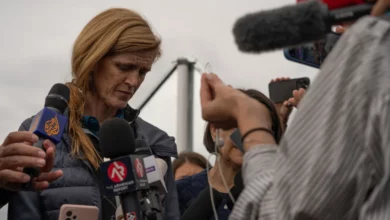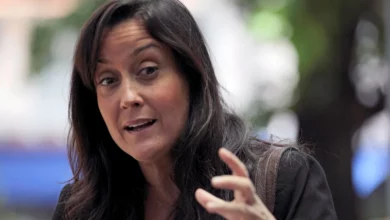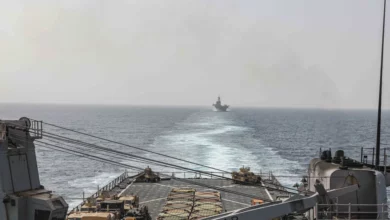Egypt's case against NGO workers, including at least 16 Americans, has sparked an unprecedented uproar in Washington, triggering what many describe as the deepest crisis in US-Egypt relations in three decades.
The 43 defendants are scheduled to go on trial on 26 February on charges of operating without a license, receiving unauthorized foreign funds, and engaging in political activity. Seven of the Americans charged remain in Egypt – including Sam LaHood, the son of Transportation Secretary Ray LaHood – and have been barred by the government from leaving.
The case has prompted direct intervention from the highest levels of the US government and has threatened to disrupt the US$1.5 billion annual aid package Egypt has received for the past 30 years from Washington.
"We are very clear that there are problems that arise from this situation that can impact all the rest of our relationship with Egypt," said Secretary of State Hillary Rodham Clinton in early February.
Over the past few weeks, Clinton, President Obama, Defense Secretary Leon Panetta, Chairman of the Joint Chiefs of Staff General Martin Dempsey, and a Congressional delegation led by Senator John McCain have all met or spoken with Egypt’s military leaders, urging them to drop the investigation.
Earlier this month, 40 members of Congress signed a letter addressed to Field Marshall Mohamed Hussein Tantawi – the head of the Supreme Council of Armed Forces – warning the NGO investigation was putting US foreign aid in jeopardy. "The absence of a quick and satisfactory resolution to this issue will make it increasingly difficult for congressional supporters of a strong US-Egypt bilateral relationship to defend current levels of assistance to Egypt," the letter said.
Senator John Kerry introduced a resolution calling for an immediate end to the harassment and prosecution of NGO staff. Senator Rand Paul went further when he introduced legislation that would suspend all US aid to Egypt until the matter is resolved.
"Not everyone in this body agrees on foreign policy or on the role of foreign assistance," Paul said in remarks on the Senate floor. "But the reckless actions of Egyptian authorities in this matter should bring us together to form one undeniable conclusion – American foreign assistance dollars should never be provided to any country that bullies our citizens."
Meanwhile, lobbying firms the Livingston Group, the Moffett Group, and the Podesta Group, which together represented the Egyptian government’s interests in Washington, terminated their contracts after coming under intense criticism for circulating talking points defending the raids on NGOs.
The crackdown on civil society in Egypt is of grave concern but not new, having occurred in various forms under the Mubarak regime in the years leading up to the revolution.
Yet the firestorm in Washington does not appear to be out of any genuine concern for promoting political freedom and social justice in Egypt, rather, it seems to be a protective fury over the targeting of the American groups, two of which – the International Republican Institute and the Democratic National Institute – get the bulk of their funding from the US government.
This disparity is evident when comparing the backlash over the NGO investigation with the reaction from the Obama administration and US lawmakers to repeated human rights abuses committed against Egyptians over the past year, including the killing and jailing of protesters. In the past few months alone, US officials have responded to some of the most violent episodes of the transitional period with tepid statements of "concern" and have, at times, reaffirmed US ties with Egypt and a continued flow of aid.
On 9 October, army soldiers attacked a demonstration of Coptic Christians and their supporters, firing live ammunition and driving armored personnel carriers into the crowd and leaving 27 people dead and hundreds injured. The day after the attack, the White House released a statement saying Obama was "deeply concerned" about the violence" and called for "restraint on all sides so that Egyptians can move forward together to forge a strong and united Egypt."
Two weeks later, Obama called Tantawi to "to reaffirm the close partnership between the United States and Egypt," according to another White House statement. "The president emphasized his support for full funding by the Congress of the Administration’s request for assistance for Egypt, without conditions."
In early November, Andrew Shapiro, assistant secretary of state for political-military affairs, reiterated this point when he told a meeting at the Washington Institute for Near East Policy that “conditioning assistance risks putting our relations with Egypt in a contentious place at the worst possible moment.”
Just over two weeks later, clashes broke out between protesters and Central Security Forces on Mohammed Mahmoud Street off of Tahrir Square. For five straight days, police fired live ammunition, birdshot and unprecedented amounts of tear gas – much of it imported from the United States. At least 45 people were killed and more than 3,000 injured, including dozens who lost their eyes.
The response from the White House was, again, muted. "We have condemned the excessive use of force against [protesters] and called for restraint on all sides," it said in a statement. The issue of US aid was never broached.
Similarly, US officials have issued repeated lukewarm statements of "concern" over the imprisoning of more than 12,000 civilians in military tribunals in the first seven months of rule by the Supreme Council while continuing to maintain close ties with the ruling generals, sending James Mattis, the Commander of US Central Command, on repeated trips to Egypt to meet with Tantawi.
It remains to be seen whether the NGO issue will actually affect US aid to Egypt. McCain's recent visit to Cairo marked a cooling down of Washington's rhetoric. The Arizona Senator and former presidential candidate told reporters that Tantawi assured him the Supreme Council is working "very diligently" to "resolve" the issue.
Among those concerned about the future of Washington's relationship with Egypt are US defense contractors like Lockheed Martin and General Dynamics who benefit from weapons sales financed through the aid. Egypt has received $1.3 billion annually since 1979 in Foreign Military Financing, which contractually must be spent with US companies. Under this arrangement, the majority of US military aid to Egypt flows back to American corporations. Thirty percent of the funds are spent on new weapons with the remainder largely spent on upgrades to existing equipment, maintenance and support contracts.
With all eyes on the NGO crisis and the future of US-Egypt relations, it is important to focus on what Washington's concerns really are and whom US aid actually benefits.
Sharif Abdel Kouddous is an independent journalist based in Cairo. He is a correspondent for the TV/radio show Democracy Now! and a fellow at the Nation Institute.




